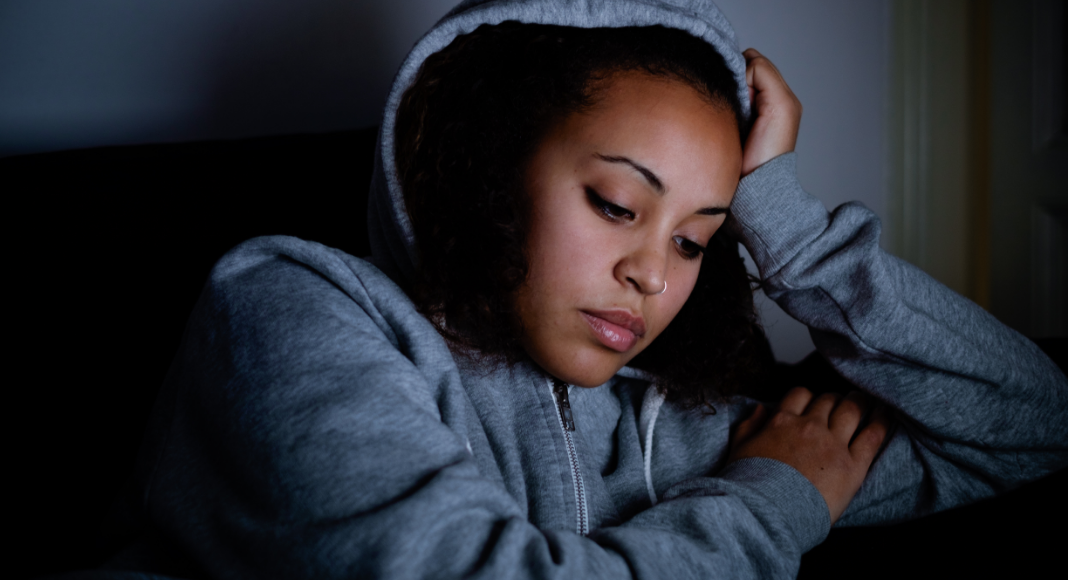I remember the first time I cried after delivering my oldest child. I stared at my taco salad and burst into tears. The intense wave of sadness came out of nowhere. To be elated over the birth of my daughter and the sorrow, at once, was odd. My nurse walked into my room during this moment. “Baby blues,” she said, offering sympathy in her voice.
I knew “baby blues” were normal. Dinner time was the hardest. The overwhelming sadness seemed to hit when I would sit down to eat. The second I looked at my baby, in her swing, the tightness, in my throat, swelled, and my eyes burned with tears. My hormones were a mess, and I knew, at some point, they would regulate.
The crying eased up, but nothing prepared me for the postpartum anxiety that followed.

My expectations regarding postpartum depression were that I would cry more than usual and withdraw. The initial sadness would linger into something much bigger and darker. I learned a little in nursing school during my labor and delivery semester, a couple of slides on baby blues and postpartum depression. I never heard of postpartum anxiety or learned about thoughts and feelings beyond sadness. I have a history of depression, and I knew it would place me at risk for PPD.
I’m not exactly sure when the thoughts started. I was exhausted, stressed over everything, and worried about my daughter’s health. I knew something was wrong, and there was no proof. I would find out months later that she had a stroke during my pregnancy. Everything was a blur.
The best way I can describe the thoughts is by watching a movie that I could not pause in my head.
I had no control over the images of my daughter, images of violence, and harm inflicted on her. I frequently had visions of someone taking her out of my arms and throwing her into traffic. I could not watch the news. Any story regarding violence or catastrophe triggered unwanted thoughts.
On the outside, I appeared to be doing alright, but I was crumbling on the inside. The tears I shed were an easy coverup as I could blame my hormones for being out of balance. I was terrified. I could not believe my mind was capable of such horrific thoughts. I was supposed to enjoy my newborn, not live in fear over the unthinkable.
In addition to my thoughts, I developed a fear of the world ending, through a massive blow-up or everyone disappearing except for my daughter, who would lay helpless and suffer. Nights were the scariest. I did not want to be alone. My anxiety started affecting my job. I was a registered nurse, working 12-hour shifts on an inpatient oncology unit. I doubted myself in every area of my career and worried I would kill a patient.
I knew my thoughts were irrational, but my mind convinced me talking about them out loud would cause injury to my baby or the world to end. This was something I was not willing to risk. I suffered in silence.
I was on antidepressants before pregnancy. When I found out I was expecting, I stopped taking my medication. I never thought of starting back up. Mentally, I was okay throughout my pregnancy. I figured I would go back if needed after delivery. I don’t know what the turning point was, but I made a well visit with my primary care physician. I brought up going back on medication without going into details. My thoughts slowed over time. I began to feel comfortable verbalizing my fears.
Moving forward, I was proactive.
I had a conversation about postpartum anxiety with my OB during my next pregnancy. We made a plan that we both agreed was the best. When I delivered my next child, I was on a low dose of my medication. I was vigilant about my symptoms and thoughts. Although I did not have intrusive thoughts, I felt more anger than usual. I had no hesitation in reaching out this time around.
It is still hard to talk about. I hate to verbalize what was going through my mind. The nature of my thoughts was graphic and disturbing. Who wants to admit to such horrible thoughts?
Putting yourself out there is hard. Being vulnerable is scary. We fear judgment, and when we face blank stares or no words, we wonder if we said too much. What if nobody can relate?
It is still hard to talk about, but it is important. Opening up is scary, but so is what many women experience following birth. Even with basic knowledge and understanding of potential hardships, there is still a multitude of symptoms that are not widely discussed. Postpartum anxiety is not one size fits all. As a new mom, I wish I knew more. We can’t change our darkest moments but what can do is use our experiences to reach others.












